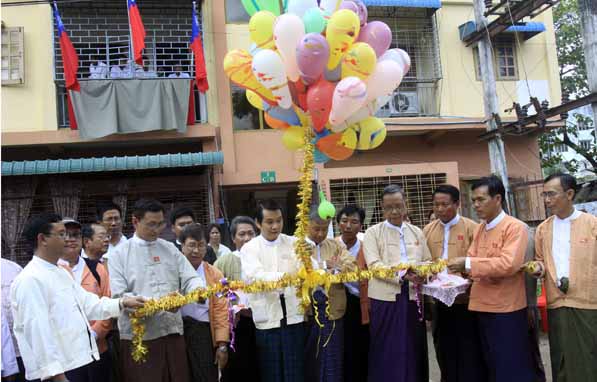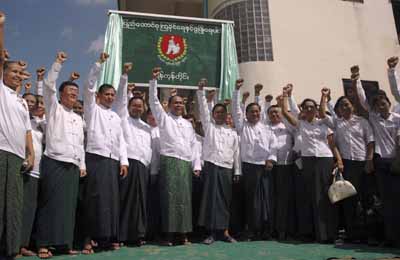Avoiding Details Like the Devil

The NDF’s policy paper also criticizes the current economic situation, saying: “The economy is declining and the income gap is very large while the size of the middle class is shrinking in the country.” Asked to elaborate on these assessments, the chairman of the NDF, Than Nyein, said: “People know the situation, and I don’t need to say anything. I want to talk only about our party’s policies.”
 |
| Members of the U nion Solidarity and Development P arty celebrate the opening of a campaign office in Rangoon on Aug. 20. (Photo: AP) |
The problem is that their differences, with one important exception, have not been elaborated, so there is no way of knowing whether an NDF or DPM-led government would have economic policies any different from those of the junta. The one exception lies in the area of land ownership.
Burma is an agro-economic society, with 70 percent of the population living in rural areas. In the era of the Burmese Socialist Programme Party (BSPP), led by Gen Ne Win, the socialist government declared that all the land, water and air are owned by the state, with farmers only having “the right to work on their farmland.”
Despite the fact that Burma’s socialist economy collapsed in 1988, the USDP has embraced the old BSPP policy, saying, “If they let the farmers own their farmlands, they will fall into the hands of the rich, leading to a new era of feudal landlords and landless farmers.”
Ironically, the National Unity Party (NUP), formerly the BSPP, has now given up on its old unsuccessful land ownership policy. And the SNDP, the NDF, the CPP, the Democratic Party (Myanmar) and the Kayin Peoples Party (KPP), among others, have all rejected the old policy of state-owned land as well.
“Only with a clear sense of ownership will farmers have an incentive to increase their productivity,” said Saw Say Wah, the secretary-general of the KPP. “Without real ownership, the farmers may find themselves in difficult straits, since the government can distribute or confiscate land at its own discretion.”
The CPP platform says it will introduce a land law focusing on the fair ownership of farmlands, and the SNDP party platform states, “The party believes that farmers have the right to own their farmland and the right to transfer the ownership of their lands.” In addition, as part of its “green environment scheme,” the SNDP will encourage individuals and groups to own and maintain private forests.
With few exceptions, therefore, the new political parties propose a break from the regime on the macro-economic issues of state influence over the economy and private land ownership. However, when it comes to the details of how these changes would be brought about, and just as importantly how the micro-economic issues of spurring local business and agricultural activity and productivity in a manner that creates sustainable jobs paying a living wage, the new political parties are either silent or extremely vague.
While politicians worldwide are known for dodging economic questions and creating broad-brush policy platforms, Burma’s new breed of politicians seem to be operating well below a bar that has already been set very low. It is understood that they have an uphill task—they face a parliament that will surely be dominated by the USDP, as well as an entrenched junta bureaucracy that will be resistant to change. At some point, however, the opposition politicians who have been pushing for a seat at the table of governance will have to step up and make detailed economic proposals that show they are prepared to govern.
« previous 1 | 2 | 3 |
